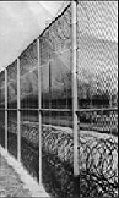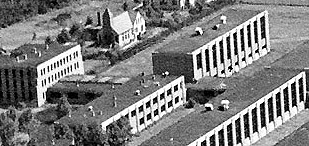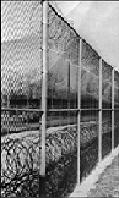JAIL CHAPLAIN
One evening in 1980 1 was called to the telephone. It was a friend of mine, a Jesuit priest who was a chaplain at Rikers Island. "I have to leave New York and go to Washington, D.C.," he said, "and I can't find anyone to replace me at the jail. Could you go to Rikers to say Mass on Sunday?"
"Well," I replied, "I have never done it. I don't know what a prison is like."
"Would you try it?" he asked. "It's enough if you just make a start."
. . . . On September 8, 1980, after a trial period of several months, I was hired at Rikers. Just before that I had spent three years as a medical aide in a detoxification center for alcoholics.
In fact, I was well-prepared for my entry into this world. I had spent years on the Bowery, in the very heart of the urban jungle. . . .
Oh yes, the Bowery was a world full of ridges and wrinkles, often overwhelming. There was not much to be said; it was more a matter of being there, as a friend, with the marginal means at hand. At the detox center on Third Street the corps of doctors, nurses and medical aides was tied together by a common purpose: How many people have we, if not rescued, at least put back on their feet for a while? I was there, not knowing that it was
preparing me quite naturally for what I would encounter every day at Rikers. . . . I discovered that it was my priestly life that was wholly engaged in the adventure at Rikers.
One of the first prisoners I met was called Kenneth. I had seen him in his cell and had been able to bring him an orange. It was clear that he had not eaten one for a long time. He didn't devour it; he savored it with a slowness and attention that I have never forgotten. That gesture had meaning. It restored a power and nobility to something we no longer recognize and have lost. Or there was another one, Ernie, in the solitary cell ("bing") of the HDM (House of Detention for Men). Clinging to the bars of his cell, he stared intently at a bird outside the window. "I tell you, when I get out I'll never be able to look at a bird in a cage again. I'll open the door for it," he said.
At Rikers nothing is separate from anything else. I read the graffiti on the wall: "Kill for fun," "God doesn't exist here," "Hell cannot last forever." The purpose of my presence is to make sure that that hell doesn't last, not to make people in prison believe in paradise. That would be very difficult in a place where everything around us vomits sterility and gloom, not to say perversity. But escape is not the way; it is not an adequate response. The demands of humanity seep in through the tiniest crack. I am there to promote and enlarge the crack and, in the field allotted to me, to do everything to help the inmates escape from their despair.
It is these people's patience that strikes me most -- the prisoners for whom life is reduced to a struggle with the system, with a set of rules that crushes both person and identity. Immediately upon arrival a prisoner receives a number. At every moment he must be prepared to give his number, to show his card. The whole value of the church consists in telling him that he is not a number, that each of us is called by name, that there is another solution.
My work as a chaplain is above all a priestly service; in principle it is a working at depth. As regards physical healing, we all know there comes a moment when it doesn't happen. There comes a time, even for the greatest doctors, when every remedy, every best effort, even the best diagnostic technique fails. . . . But as a priest I am on another level, in search of a different sensibility, vowed to another frustration, gnawed at the core by a message. I, too, have to contend with a certain type of sickness . . . .
. . . . personal contact and prolonged periods of listening fill many of my hours at Rikers. I have always believed, accepted and loved the fact that one of the priest's gifts is that of hearing the secrets of the heart, of taking risks in doing so,
and, without approving everything, nevertheless of accepting and understanding it. That is the way of entering, in the name of Jesus, into the gracious and unprecedented movement of forgiveness, that magnificent forgiveness to which I will return later in this book. . . . . I know names, faces, life stories. I do not know the penal population, the criminal world. . . .
I see and have seen plenty of tears in the prison: the man who killed another man who had raped his daughter and is serving a 15-year sentence; another, totally crushed, who begged me to pray for him because he had killed the father of a family. These are the faces that pursue me. They do not frighten me, but I keep them within myself. These are the people whom human law has given up on and plowed under, who have no more chance of rising again on this earth. For them I am a kind of emergency exit, a way to a "somewhere else" that is blocked for them.
This is the daily reality in this "big house." I do not read about it in the papers; it is there and hits me in the face. It may be that I succumb to a sort of fascination before this wordless cry in the midst of what is strange, excessive, irrational and illogical, of absurdity raised to the ultimate degree in every situation. . . . This morning I saw a big sign on the scraped down front of a house in Brooklyn: "Fitness Center. Please pardon our appearance. We are under construction." I had no trouble recognizing that our "fitness
center," our church at Rikers, is often rough in its appearance. Is it too forced an idea to want to see it as "under construction"?
At Bible class the other day we were preparing the reading for the next Sunday's Mass. It was Paul's letter in which he says: "You are not in the flesh, you are in the spirit" (Rom 8:9). One of the prisoners shouted out: "But that's for us! We may be prisoners, but those words are for us, too. We aren't some kind of garbage. Or if one of us is, it isn't God who's going to tell us so when he is with us!" Another said: "For society, we are always criminals. But there are a lot of people here who are trying to get out of that with God! An awful lot of the time He is the only one you can talk to!"
. . . Am I just prettying-up the reality? Is this just a special pair of spectacles, focused to conceal and put to sleep all the evil and distress? If there is always the grave danger of slipping away into facile dreams, still one cannot say that God is not present here, or that no one calls on God. It is God alone who can say the final word that graces and transforms, when everything else has been a lamentable failure.
Being a priest in a prison . . . means talking of God to people who now want desperately to listen, when they never before had or, often, have lost all knowledge of and all confidence in God. How is it possible, in this situation, to avoid moralism or paternalism, even a too-easy sense of power over people, often young people for whom the adult world has quite often lost all credibility? Is there not all too often an invitation to play a role, to enter into an artificial attitude from the very start, and thus to be quickly condemned? . . . .
Reflecting on the word role, I realize that I have the good luck not to be part of a system in which the precise role of each person is all too well defined. I have not been hired here to make the place run, with responsibilities for surveillance, administration or even control. In this place full of rules, constraints, answers that often come too quickly, I have the good fortune to be a priest. . . . So if I have to use the word role, it may be simply the role of an invitation card, of a signpost, of a simple piece of advice . . . . It would be terribly blasphemous and laughable, here as well as anywhere, to play God, to believe oneself comfortably endowed at a bargain price with the fire from heaven. . . .
And what do the prisoners expect of me? Not dreams and fantasies -- they have already seen enough of those! -- but hope, something more than an excess of goodwill and humanity, something other than what they have already seen enough of. . . . How can a Christian community remain a living thing inside a prison? It needs, not a role, but a group of brothers. Where there is charity, there is God. Paternalism? Certainly, there is a risk of doing everything for them and nothing through them. And, after all, one quickly discovers the anemic condition and infantile mentality of many of those who are being helped. I need first to have integrated what I try to say to the prisoners, to have made it mine before sharing it. . . .
I am the only one who comes from outside. That is a barrier
I cannot cross. I have to respect their tragedy. Here are fifty people in front of me -- fifty tragedies. How can I cross that threshold? It is a great mystery, a great risk to touch others' torment. If they give me the gift of opening their hearts to me, they have chosen me. A confidence is an entering into solidarity and dependence. From that point, you have to use your imagination.
To get acquainted with Rikers I used to go around giving birthday greetings in the housing areas. It was easy to do by getting the daily "printout." Now that is less possible, because there are so many to talk to everywhere.
An encounter cannot be forced. I want them to remain themselves. I never know, from one minute to the next, where the day will begin or what will happen as it goes on. And every day is an event. One tells me that he has killed his child. Another says he stole because he had nothing left. This one cannot talk to anyone in his family. That one, like so many, is here because of drugs.
The first imprisonment is an enormous trauma. The weight of the judicial machinery to which the prisoners have to submit, the hemorrhage of their vitality that takes place every day in prison, the thousand and one stories in which the noise, the shouts, the frustrations are repeated -- all of it is apparently there to confuse and upset them. Sometimes it is very clear that in many ways the prison is only an image of society or of the street. It is a picture of humanity with its weaknesses, its potential, its regrets and its desires. Truly, evil, vice, and lies are here, but they are not definitive or absolute. Here, too, everyone struggles in a thousand ways for an elementary dignity, truth, justice. If I were to start from the easy presumption that everyone is rotten and ought to be condemned, that there is nothing here but imposture, lies and corruption, that the enemy is everywhere at Rikers, I would have to leave very quickly, without the least hesitation, so as not to add to the number of victims.
Speaking of victims, let me say just as a quick parenthesis that nothing in these pages is intended to conceal the all-too evident reasons why some people have to lock up others. The victims of all sorts of crimes, some of which are beyond all comprehension, are the first and most violently wounded. I have no
desire to blot out or be deaf to all the cries and bitterness at the senselessness of the injuries, catastrophes and bereavement in so many faces. The silence of misery is always burning on every side, wherever I go. But I will return to that later.
Officially, the scope of my duties is simply that of religious service. But to the extent that the administration lets me enter the prison and interact with the prisoners, I have no problem with the system. The administration has no power to control the dialogue between me and the prisoners. It is in that space that I have my unique place and reason for being there.
Am I an accomplice or an enemy of the system by thus giving it some breathing space? I often ask myself that question. In the eyes and the pity of God, I cannot be the enemy of anything but evil. The peace I am looking for, and what I try to find together with the prisoners, is not the peace sought by the administration of the prison. I do not have a relationship of domination with the prisoners. I am with them in a system which, if they come to express it, with our fatalism toward all others and given the opposition of the races, is primarily an encounter of enormous poverties, a mine field of questions. And they know well that the gospel has something to do with all that.
Should the confidential character of these relationships extend to silence about the violent projects around me, the threats that fall on some prisoners or correction officers? . . . I answer that, first of all, I would do everything possible to get outside the realm of sacramental secrecy. The sacrament is a place of completion, of perfection, not of destruction. After that I would try, in the scope allowed to me, and with all discretion, to consider the possibilities. I would act according to my conscience. I am neither a hero nor a fool. One may readily suppose that I would not remain inactive or maintain a complicitous silence. As a chaplain, I think that there are always ways, without betraying anyone, of preventing some greater evil. But that is only true, of course, to the extent that there exists absolute trust on the part of the administration.
. . . . One may never dismiss the impact of nitpicking rules or of suspicion. It is true that there are moments that are hard to bear, even if they are not necessarily related to the harsh atmosphere of the prison. Worst of all are the periods of difficult communications, when one senses that the rules are being tightened, for example after periods of violence or mutinies. There are objective prohibitions that prevent us from carrying out our mission correctly, that is, normally; for example, there is the frustration of waiting for people who never come because no one has gone to fetch them.
There are also communication problems with prisoners, who are not all angels and not all prepared for truthful encounters. Indeed, it is true that often the prison chaplain goes through discouraging periods, when he or she wants to escape, to get back to simple things, to normality, which is so rarely found here. We say that you can only see the stars when it is night. It is true, but sometimes there are nights without any stars.
When I came here I had some rather static ideas about the human condition and a fairly well-defined system of references and values. Without having undergone, thank God, a complete destabilization of my certitudes and ways of thinking, I think that now I am more receptive to change, to things as they come. . . . The fact of being a stranger, of coming from far away, of having had to adapt myself, of being somehow in exile as the prisoners are, has brought me closer to them. Like them, I am continually obliged to rub up against a strange environment, a culture, a way of life. No doubt with time there comes an acclimation, an adaptation, a greater facility of acceptance. But it is still the case that the prison often makes me think of Jacob's wrestling match. . . .
. . . . I need to receive the shock of the gospel as well as to transmit it to this prison population. They are the ones who very often give me the gift of hearing. How many times have I heard these words: "I thank God that I am here today." It is they who have taught me the evil that oppresses, the freedom that is sought. In my soul and my conscience I could never canonize the prison, but I give thanks to God for the things that come from there. . . .





